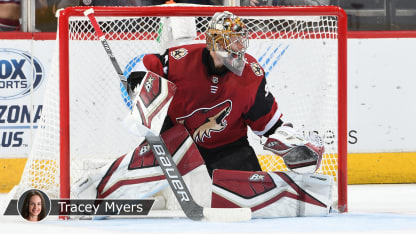As the Coyotes have improved, so has Raanta. The 29-year-old is 5-4-0 with a 2.10 goals-against average and .929 save percentage this season, and he made an NHL career-high 48 saves in Arizona's 4-3 overtime win against the Carolina Hurricanes on Friday. The Coyotes, who began last season 1-11-1, are 7-5-0 and will take a five-game winning streak into their game against the Philadelphia Flyers at Gila River Arena on Monday (9 p.m. ET; FS-A, NBCSP, NHL.TV).
One big reason is Raanta, who is living up to the three-year contract he signed with the Coyotes on April 6.
"When you sign a new deal, you want to do everything possible that you're worth that deal," said Raanta, who came to the Coyotes in a trade with the New York Rangers on June 23, 2017. "There are still some things I want to work on. When you're playing hockey, there's always something you want to do better. But I think we're on the right track with that."
Chicago Blackhawks goalie Corey Crawford, for whom Raanta was a backup for two seasons (2013-15), sees Raanta's improvement.
"He just looks calm in there," Crawford said. "He's always kind of been that goalie, but it seems he's relying less on his flexibility and more on strength and getting into position. He's a great reactor. But when you're there, when your full body's there, it makes it easier on you to make saves instead of being stretched out all the time."
Raanta was a solid backup goalie. He was 20-9-5 with a 2.41 GAA and .912 save percentage with the Blackhawks from 2013-15 and 27-14-4 with a 2.25 GAA and .921 save percentage playing behind Henrik Lundqvist with the Rangers from 2015-17. But going from backup to starter is a challenge. Crawford, a backup for the Blackhawks in 2010-11 before becoming the starter in 2011-12, altered some of his training habits, including lifting weights less often. He also had to get mentally stronger.
"When you become a No. 1, you have those stretches that aren't so good," Crawford said. "You learn to try to just let it go throughout a game. A bad goal, couple of bad goals, it's just 'next play, next play.' because you never know what the difference is going to be in a game. If you let something bother you and it carries on, the next one could be the difference -- or the next save could be the difference."


















